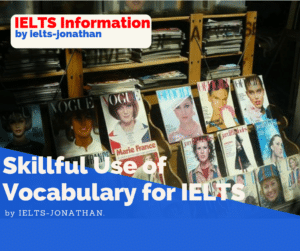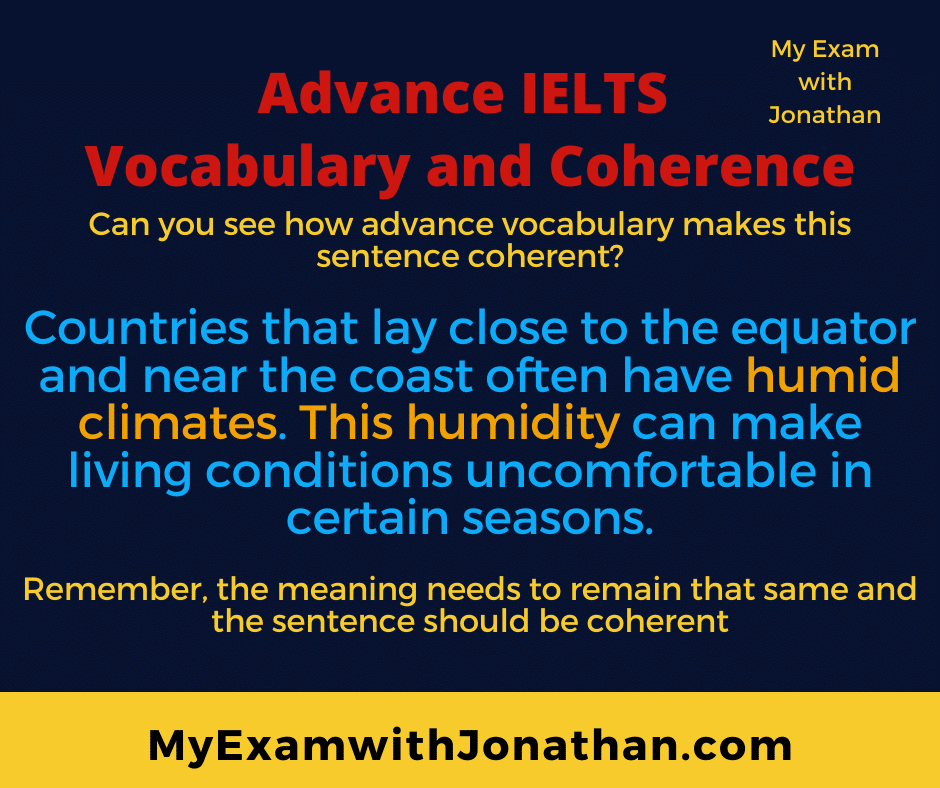Vocabulary Development
Vocabulary is not just the vocabulary you know, but also how you are able to use it.
I’ve carefully examined the marking descriptors for IELTS Writing Task 1 and 2 and IELTS Speaking and LEXICAL RESOURCE is a feature of both parts.
High Scoring Vocabulary
An important criteria for a higher band is ‘skillfully uses uncommon lexical items’ and another is ‘sufficient range of vocabulary to allow flexibility and precision’.
You can easily impress the examiner and increase your IELTS Band in IELTS Writing by paraphrasing providing the examiner with a range and variety of synonyms.
In IELTS Speaking you can do something similar, and in addition you can rephrase your own remarks.
However, it’s probably not a good idea to just to repeat every question the examiner gives. In my opinion, that would just annoy the examiner!
Study the examples below and consider how they second example is a paraphrase, uses synonyms effectively , or rephrases the original example.
Vocabulary Development Examples
- Contemporary Singapore is an interesting mix of the modern and the traditional.
- It’s futile to resist history. Things change and you can’t stop it.
- Apple was successful because of its innovation in producing and marketing new technologies such as personal home computers and keyboard-less mobile phones.
- The traditional cuisine of Italy is often regarded as being collective in nature. Meal preparation and eating times are often based around the family unit.
- Countries that lay close to the equator and near the coast often have humid climates. This humidity can make living conditions uncomfortable in certain seasons.
- It is often considered that having parents that push their children to do well in school leads to bright, happy, motivated and successful students. However, this pressure to succeed academically does not always produce the intended results.
Learner Training
In writing, paraphrasing and using vocabulary is a skill that teachers encourage students to develop.
Teachers often use tasks, such as the one below, to improve learners awareness of grammar, vocabulary and textual awareness.
This task is called an error correction exercise.
Read and consider improving the text
Can you find errors in word choice, grammar, or punctuation?
Can you improve the meaning without CHANGING the meaning?
Finally, can you arrange the text so it reads cohesively?
Replacing Traditional Energy Sources
Over the last one hundred years the main sources of energy in the world is fossil fuels – coal, oil and natural gas. Fossil fuels are non-renewable – this mean that nature cannot recreate them as fast as people using them up today. Sometime in the future, all of them run out and we will need other, renewable, sources of energy. Some renewable energy sources are being available now. One of them is water, what has been used to create energy for thousands of years. Today, hydro- or water power, generate by huge dams, is a major source of electricity in many parts of the world. But the hydropower have its own costs. When dams are building, the area above them is flooded, sometimes for miles. In some places, people loses their homes as well as the rich river soil in which they once growed their crops. In other places, wonderful wild landscapes buried forever under new, artificial lakes. Below the dams, the natural habitats of fish and wildlife in river valley is destroyed as the course of the river is changed.
Adapted from esl.fis.edu
Replacing Traditional Energy Sources Answer Key
Replacing Traditional Energy Sources Answer Final Key
I’m Jonathan
I’ve taught IELTS and University English in more than a dozen universities and schools around the world.
I’m a parent, traveller and passionate about language teaching and helping students achieve their dreams.
Whilst living in Austria or working in Asia, I run IELTS courses to help students get to where they want to be.
If you are serious about IELTS, connect with me to see how I can help you.






Was this helpful? Leave a comment :)